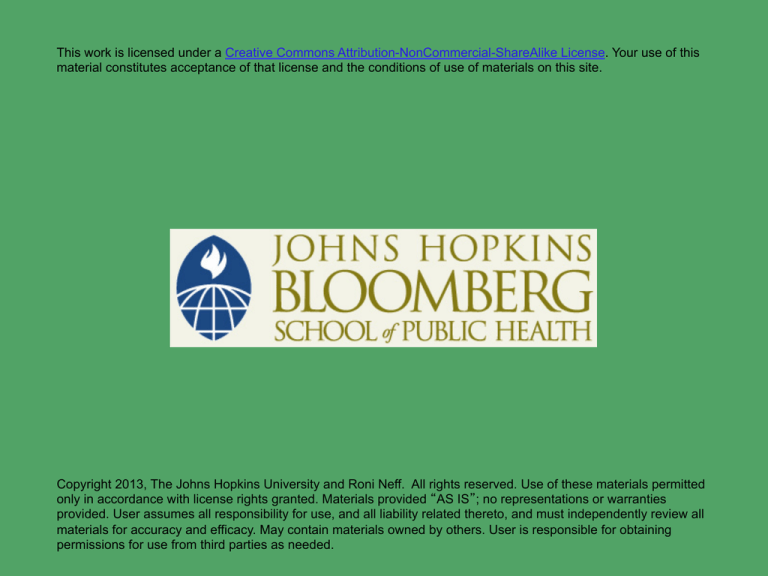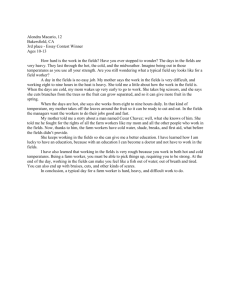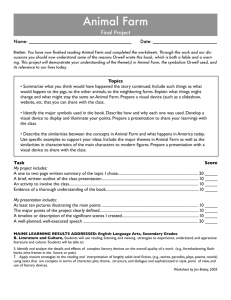
This work is licensed under a Creative Commons Attribution-NonCommercial-ShareAlike License. Your use of this
material constitutes acceptance of that license and the conditions of use of materials on this site.
Copyright 2013, The Johns Hopkins University and Roni Neff. All rights reserved. Use of these materials permitted
only in accordance with license rights granted. Materials provided “AS IS”; no representations or warranties
provided. User assumes all responsibility for use, and all liability related thereto, and must independently review all
materials for accuracy and efficacy. May contain materials owned by others. User is responsible for obtaining
permissions for use from third parties as needed.
House/Senate Agriculture Committees
Source: The Farm Bill Primer. Retrieved from http://farmbillprimer.org/maps/
2
Farm Bill Stakeholders
n
Historically driven by agricultural interests
n
Anti-hunger: SNAP brings urban legislators on board with commodity
policy
n
Other
- Sustainable agriculture, environment
- International development
-
n
Community food security
Health is newcomer
3
Public Health Engagement in the Farm Bill
n
2008
- Ad hoc coalition: healthy/
sustainably produced
foods in Nutrition Title
- APHA—Farm Bill is one of
top three policy priorities
- Health professionals’ signon letter
- All identified priorities
were successful
n
2012
- Healthy Farms Healthy
People Coalition
- GOAT coalition
- Ad hoc nutrition coalition
- Physicians Committee for
Responsible Medicine
coalition
-
-
-
APHA
SNAP to Health
Mapping a Sustainable
Agriculture & Public
Health Alliance for the
Next Farm Bill
4
Seattle Farm Bill Principles
5
Health-Related Marker Bills
n
Local Farms, Food and Jobs Act
- Sponsors Pingree (House), Brown (Senate)
- Build local food infrastructure, slaughterhouses
- Require USDA to research non-GM seeds and breeds
- New crop insurance program for organic/diversified farms
- Reduce barriers to school/institutional local food procurement
- Improve farmers market access for SNAP recipients
n
Healthy Food Financing Initiative
- $125 million loan and grant financing
6
Expiring Programs
n
Among “most forward-looking” in Farm Bill
n
Many are public health, conservation priorities
-
-
-
-
-
-
-
-
-
Conservation Reserve Program—Transition Incentive Program
Beginning Farmer and Rancher Development Program
Outreach and Assistance to Socially Disadvantaged Farmers and
Ranchers
National Organic Certification Cost Share Program
Organic Agriculture Research and Extension Initiative
Specialty Crop Research Initiative
Organic Production and Market Data Initiatives
Rural Microentrepreneur Assistance Program
Value-Added Producer Grants (VAPG)
7
Key Changes under Discussion
n
SNAP cuts
n
Direct payments
n
Crop insurance
- Conservation compliance
- “like giving a homeowner cut rate fire insurance but not
requiring fire extinguishers” — Kleinschmidt
8
Farm Bill 2012 in a Word
n
Budget
9
Farm Bill 2012 in a Word
n
Budget
n
Election year
10
Farm Bill 2012 in a Word
n
Budget
n
Election year
n
Drought
11
Drought
n
Most severe, extensive drought in 25 years (USDA)
n
Mid-August—60% of US farms
n
Need for disaster assistance could pressure some to pass a bill they
dislike
n
Cuts to conservation
12
Drought
Source: Cartoon a Day. Retrieved from http://www.cartoonaday.com/midwest-drought-troubles-the-nation/
13
How It Has All Played Out …
n
… thus far
14
2011–2012
n
Supercommittee fails à sequestration (cuts $7 billion)
- Mandatory cut of $984 billion
- Will it happen?
n
Senate passes its bill (cuts $23 billion)
n
House Agriculture Committee passes bill (cuts $35 billion)
n
House bill does not make it to floor
15
House Bill Politics
n
SNAP
- Republicans want to cut $16 billion, from 2 to 3 million would
lose benefits
- Democrats don’t want to vote for bill
n
Farm safety net
- Tea party wants deep cuts, end subsidies
- Other Republicans traditionally supported these programs
16
House Bill Politics (cont.)
n
House leaders don’t want to bring to floor—election year
- Not enough votes to pass (?)
- Debate could be divisive, harm candidates up for election
Tea Party might demand further SNAP cuts
Don’t want to be seen passing nearly a trillion dollar bill
(over 10 years)
Liberals could portray them as harming farmers, children,
etc.
-
If next year, possible power shift à deeper cuts
17
October 1, 2012: Farm Bill Expires
n
No extension
n
Revert to 1949, 1938 Farm Bills
-
-
Different era—lower production, higher prices; doesn’t cover
soybeans, others; supply management
Most commodity impacts start when harvesting crops planted—
January 2013—but farmers need to plan
Milk affected sooner … $38 milk?
-
-
Cost, time to plan to revert back
SNAP, Crop Insurance don’t expire now
18
Farm Bill Expires
n
37 programs without baseline also expired
n
Other programs funded but lose authority to use their funds
-
-
n
Farmers Market Nutrition Program
Specialty Crop Block Grant Program
Senate, House Agriculture Committee bills included them
19
Post-election Farm Bill?
n
Possible: House passes bill, conference, floor votes, President’s
signature within five weeks
n
If not: Congress extends 2008 Farm Bill
à Start all over next year
n
Better to start over?
- Yes
-
Maybe could avoid objectionable parts: SNAP cuts, not
enough reform
No
Fewer funds to work with
Many programs expire
Educate new members
Time, effort
20
What’s Missing?
n
Climate change
- Bills actually cut CSP to pay for crop insurance
n
IFAP
n
True commodity program reform
- Supply management
n
Competition
n
Farm worker health
21
What’s There but Needs Expansion?
n
Support for farmers (including loans, access to insurance)
- Sustainable
- Diversified
- Transitioning
- Fruit and vegetable producers
- Small and mid-sized
- New and socially disadvantaged
n
Demand for healthy, local/regional
n
Local/regional food system infrastructure
n
Research to support healthier food system
22
After the Farm Bill
n
Support/follow-up
- Appropriations process, rulemaking
- Internal follow-up/oversight with agencies
n
Stay vigilant
n
Prepare for next Farm Bill
- Research, pilots
-
n
Continuous effort/organizing
Need long-term vision to use Farm Bill to shift food system in
positive, healthy direction
23
What You Can Do
n
Those with public health expertise can play an important role in
advancing priorities
n
Stay tuned for action alerts and opportunities to join in
n
Help raise awareness (film screening? book discussion group? talk
with friends and family)
n
Visit with and/or write letters to legislators
n
Op-eds, letters to the editor
n
Continue educating yourself
n
Address campaign finance, transparency issues, too
24
Ways to Stay Up to Date
n
Farm Policy email updates
- http://farmpolicy.com/
n
Understanding the Farm Bill Facebook Page
- http://www.facebook.com/UnderstandingTheFarmBill
n
National Sustainable Agriculture Coalition
- http://sustainableagriculture.net/blog/
n
Healthy Farms Healthy People Coalition
-
http://hfhpcoalition.org
n
SNAP to Health Web site
- http://www.snaptohealth.org/
n
CLF Farm Bill page
- http://www.jhsph.edu/research/centers-and-institutes/johnshopkins-center-for-a-livable-future/projects/FFP/farm_bill/
25
Farm Bill Budget Visualizer
n
http://www.jhu.edu/farmbillvisualizer/
26
Conclusions
27



